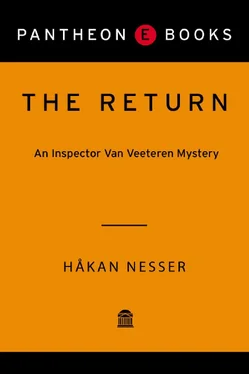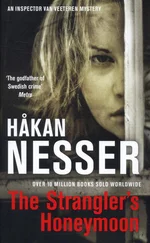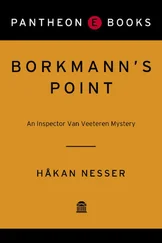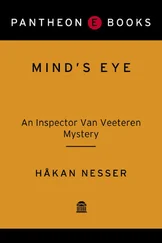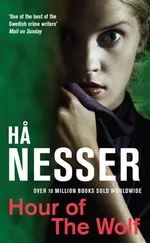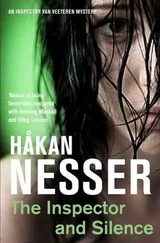Hakan Nesser - The Return
Здесь есть возможность читать онлайн «Hakan Nesser - The Return» весь текст электронной книги совершенно бесплатно (целиком полную версию без сокращений). В некоторых случаях можно слушать аудио, скачать через торрент в формате fb2 и присутствует краткое содержание. Жанр: Полицейский детектив, на английском языке. Описание произведения, (предисловие) а так же отзывы посетителей доступны на портале библиотеки ЛибКат.
- Название:The Return
- Автор:
- Жанр:
- Год:неизвестен
- ISBN:нет данных
- Рейтинг книги:5 / 5. Голосов: 1
-
Избранное:Добавить в избранное
- Отзывы:
-
Ваша оценка:
- 100
- 1
- 2
- 3
- 4
- 5
The Return: краткое содержание, описание и аннотация
Предлагаем к чтению аннотацию, описание, краткое содержание или предисловие (зависит от того, что написал сам автор книги «The Return»). Если вы не нашли необходимую информацию о книге — напишите в комментариях, мы постараемся отыскать её.
The Return — читать онлайн бесплатно полную книгу (весь текст) целиком
Ниже представлен текст книги, разбитый по страницам. Система сохранения места последней прочитанной страницы, позволяет с удобством читать онлайн бесплатно книгу «The Return», без необходимости каждый раз заново искать на чём Вы остановились. Поставьте закладку, и сможете в любой момент перейти на страницу, на которой закончили чтение.
Интервал:
Закладка:
“Yes?”
“Detective Inspector Munster. I have an appointment with the judge.”
“Please come this way,” she said, opening the gate a little wider.
She was buxom, with pretty red hair. She couldn’t be more than nineteen or twenty, Munster thought.
What strange worlds there were in existence.
Judge Heidelbluum received visitors in his library, but the French doors were open, leading out to a newly mowed lawn and fruit trees in blossom. The contrast between inside and outside was so marked, it almost seemed to be a parody of the situation, Munster thought. Outside, it was early summer, new life stirring and sprouting, fresh scents and birdsong; inside, it was predominantly dark oak, leather, damask and old books. And a rather pungent smell from the blackish green cigarillos that Heidelbluum insisted on smoking one puff at a time, before depositing them in an ashtray of oxblood-colored porphyry on the desk in front of him.
A bit reminiscent of the thin cigars Van Veeteren occasionally felt like smoking, Munster noted. Both in looks and smell.
He was ushered into a leather armchair in classical Anglo-Saxon style; it had obviously been placed in front of the desk specifically for this occasion, and as Munster settled down into it, he noticed that the old judge’s bald and birdlike head was swaying back and forth a couple of feet higher than his own.
That was no coincidence, of course.
“Thank you for agreeing to see me and to let me ask you some questions,” he began.
Heidelbluum nodded. In fact he had been negative about the request until Hiller and Van Veeteren intervened and persuaded him to see reason.
He’s not quite all there, Van Veeteren had warned Munster. Not all the time, at least. Handle him carefully.
“As things stand,” Munster continued, “we would be most grateful if you would kindly give us the benefit of your views.
There doesn’t seem to be anybody who knows more about the case of Leopold Verhaven than you.”
“Quite right,” said Heidelbluum, lighting the cigarillo.
“You know that we found him murdered, I take it?”
“The chief of police mentioned that.”
“To tell you the truth, we’re groping around in the dark as far as a motive is concerned,” said Munster. “One theory we are working on is that it must be connected in some way with the Beatrice and Marlene cases.”
“In what way?” asked Heidelbluum. His tone was sharper now.
“We don’t know,” said Munster.
There was a pause. Heidelbluum drew on the cigarillo, then put it down. Munster drank a little soda water from the glass he had been given. Van Veeteren had advised him to allow the old judge plenty of time; not to put him under pressure, but give him lots of time to think and reflect. There’s no point in cross-questioning an eighty-two-year-old, he had maintained.
“It was my last case,” said Heidelbluum, clearing his throat. “The Marlene trial, that is. Hmm. My very last.”
Was there a trace of regret in his voice, or was Munster only imagining it?
“So I understand.”
“Hmm,” said Heidelbluum again.
“It would be interesting to hear what you thought of him.”
Heidelbluum ran his index and middle fingers along the inside of his shirt collar, and slightly loosened the dark blue cravat he was wearing around his neck.
“I’m an old man,” he said. “I might last for another summer, perhaps. A couple more at most.”
He paused for a moment, as if feeling for the thread. Munster eyed the rows of dark, leather-bound books behind the judge’s back. I wonder how many of them he’s read, he wondered, and how many he can remember.
“I’m not bothered about it anymore.”
“What are you not bothered about?”
“Leopold Verhaven. You’re too young to understand. He has worried me quite a lot. . Both those damned affairs. I wish I’d been able to get out of that second trial, but there again, it wouldn’t have been fair to pass it on to some other poor soul. . ”
“What do you mean?”
“I thought it would give me an opportunity to be sure about it all. Draw a line under all the doubt raised by the first tribunal.”
“Tribunal?”
“Call it whatever you like. It was a devil of a business, no matter how you look at it. Don’t quote me on that.”
“I’m not a journalist,” said Munster.
“No, of course not,” said Heidelbluum, picking up the cigarillo again.
“Am I right in thinking that you believe Verhaven was innocent?”
Heidelbluum shook his head.
“Oh no. Good Lord, no. I’ve never found anybody guilty when I didn’t think they were guilty. Good heavens no! But he t h e r e t u r n
was. . a mystery. Yes, a mystery. You and your colleagues won’t be able to make sense of it; you needed to be there and see the man. Everything about him was a mystery. I was on the bench for over thirty years, and I’ve seen it all, but I’ve never come across anything like Leopold Verhaven. Nothing.”
He lit the cigarillo and took a drag.
“Could you elaborate on that a little?”
“Hmm. Well, no, you don’t understand this. The most remarkable thing about it is that he was found to be sane enough to plead. It would have explained a lot if they’d found some kind of derangement or mental disorder, but there was never any question of that.”
“What was so remarkable about him, then?” Munster asked.
Heidelbluum thought for a while.
“There were lots of things. He didn’t care about the verdict, for instance. I’ve thought a lot about that, and my lasting impression is that Leopold Verhaven was totally indifferent about being found guilty or not. Totally indifferent.”
“That sounds odd,” said Munster.
“You bet it’s odd, damned odd. That’s what I’m saying.”
“I have the impression that he enjoyed being accused,” said Munster.
“No doubt about it,” said Heidelbluum. “He was very
happy to sit there like the spider at the center of a legal web, playing what everybody thought was the leading role. He didn’t make it obvious, of course, but I could see it in him. He longed to be in the center of things, and now he’d got what he wanted.”
“Did he enjoy it so much that he was prepared to crawl into prison for twelve years? Twice, in fact?”
Heidelbluum sighed.
“Hmm,” he said. “That’s precisely the point at the center of it all.”
Munster sat for some time without speaking, listening to the water sprinkler being used somewhere in the garden.
“When he heard the verdict, I’ll be damned if he didn’t give a little smile. Both times. What do you say to that?”
“What about the submission of evidence and the court findings, that kind of thing?” Munster asked cautiously.
“Weak,” said Heidelbluum. “But sufficient, as I said. I’ve found prisoners guilty on weaker grounds.”
“And sentenced them to twelve years?”
Heidelbluum made no reply.
“Was it the same in both trials?” Munster asked.
Heidelbluum shrugged.
“In a way,” he said. “Both were based on circumstantial evidence. Strong prosecuting counsels, Hagendeck and Kiesling.
The defending counsels did their duty, but not much more.
The Marlene case had a bit more meat to it, as it were. Lots of witnesses, meetings, precise timings-even reconstructions. A real puzzle, in fact. The first time, there was hardly anything to go on.”
“But still he was found guilty. Isn’t that a bit strange?” asked Munster, wondering as he spoke if he was going too far.
But Heidelbluum seemed not to have noticed the insinuation. He was bent over his desk, gazing out into the garden, and seemed to be lost in thought. Half a minute passed.
Читать дальшеИнтервал:
Закладка:
Похожие книги на «The Return»
Представляем Вашему вниманию похожие книги на «The Return» списком для выбора. Мы отобрали схожую по названию и смыслу литературу в надежде предоставить читателям больше вариантов отыскать новые, интересные, ещё непрочитанные произведения.
Обсуждение, отзывы о книге «The Return» и просто собственные мнения читателей. Оставьте ваши комментарии, напишите, что Вы думаете о произведении, его смысле или главных героях. Укажите что конкретно понравилось, а что нет, и почему Вы так считаете.
